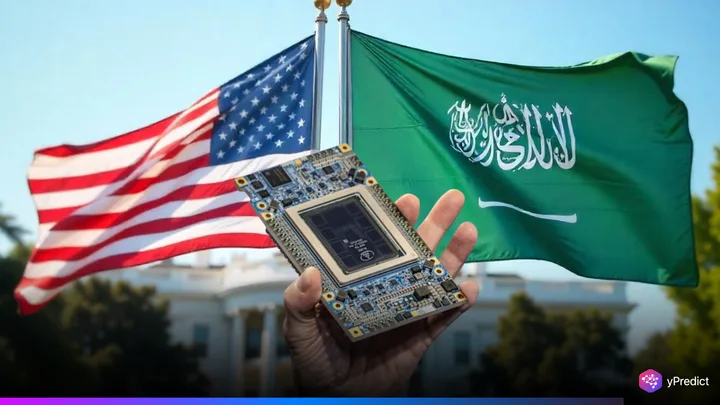
The Trump administration is moving ahead with a deal that would give Saudi Arabia greater access to powerful AI chips made by Nvidia and AMD. These chips are the backbone of today’s most advanced AI systems, from language models to image recognition. They could help Saudi Arabia grow its tech and data center industry. However, concerns over possible technology leaks to China are causing friction within US policy circles. As the AI race intensifies globally, this early-stage agreement is reigniting questions about how far the US should go in sharing its most powerful tools.
Semiconductors at the Heart of Saudi Arabia’s AI Push
This US-Saudi AI chip deal, likely to be announced during Trump’s visit to Riyadh, would support the kingdom’s push to become a leader in artificial intelligence. For Saudi officials, it’s a chance to turn their digital ambitions into reality. US lawmakers worry the technology might fall into the wrong hands. The agreement would allow the kingdom to purchase more of these semiconductors to fuel new data centers and infrastructure.
One proposal includes setting up “data embassies,” allowing data centers in Saudi Arabia to operate under foreign legal jurisdictions. “This would help create a neutral and trusted zone for innovation,” said one person involved in the negotiations. The concept is still in draft stages, but it has already drawn interest. Tech firms and governments are exploring secure global partnerships in AI.
Security Concerns and Global Competition
Despite the economic and diplomatic potential, the US-Saudi AI chip deal is controversial. Washington has restricted AI chip exports to Middle Eastern nations like Saudi Arabia and the UAE since 2023. The reason: fears that advanced semiconductors could be funneled to China, either physically or through remote access.
The Trump administration appears more open to relaxing those restrictions, with conditions. One key provision under discussion involves US oversight of the data centers using American chips. “We must prevent illegal diversion into China,” posted David Sacks, White House AI adviser, on social media. “But not at the expense of partnerships that follow strong safeguards.”
Some critics argue that enforcing such provisions may prove difficult in practice. Trust and transparency between nations will be essential if the deal is to succeed without compromising US technology security.
Will US AI Exports Expand to Other Countries?
The implications of this deal go beyond Saudi Arabia. Another similar agreement is reportedly being discussed with the UAE. The Trump administration seems to be setting a new environment for AI exports. These decisions could influence global AI supply chains, as Gulf nations grow into regional hubs for computing infrastructure and digital research.
At the same time, the shift raises important questions. Will this encourage responsible AI development across borders, or open new risks of misuse? The conversation about how to balance innovation, diplomacy, and security is likely to deepen. More countries are racing to adopt powerful AI tools.
Is AI Diplomacy the Next Frontier in Global Tech Politics?
As this agreement takes shape, some see it as a bold step toward global AI cooperation. Others warn it could weaken safeguards meant to keep critical tech out of China’s reach. The US-Saudi AI chip deal promises massive growth opportunities in the Gulf. But it also spotlights the complex web of trust, regulation, and global rivalry surrounding advanced technology.
Whether this partnership sets a precedent for secure cooperation or opens new vulnerabilities will depend on how it’s managed and monitored. With AI becoming a central axis of geopolitics, the stakes have never been higher.






